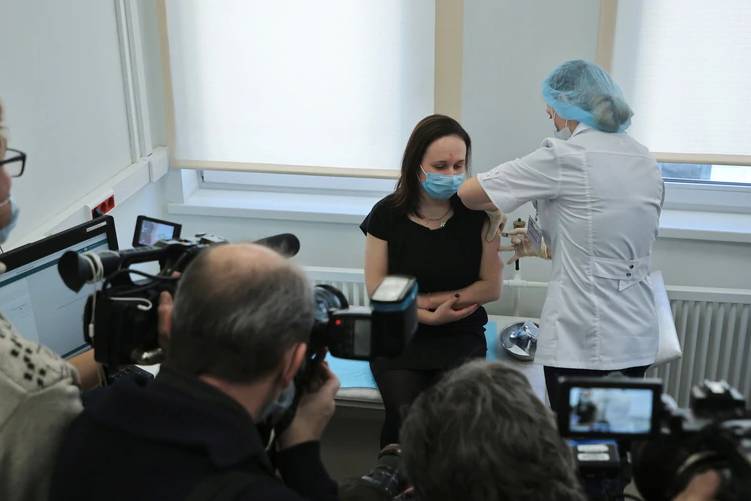Russia launched its coronavirus vaccine initiative Saturday to contain the disease that is spreading at a record pace.
The most vulnerable will receive the first doses of the vaccine named Sputnik V, including medical workers and teachers. The vaccine was approved in August, despite criticism from Western experts about the country’s dearth of clinical trial information.
Russia rolls out the vaccine as Pfizer and BioNTech are set to introduce a vaccine next week following its approval recently by Britain. The two drugmakers could receive U.S. approval later this month.
Russia ranks fourth in the world in coronavirus infections, with more than 2.4 million, according to the Johns Hopkins Coronavirus Resource Center.
On Friday, Bahrain became the second country to approve emergency use of the Pfizer-BioNTech coronavirus vaccine, after Britain.
The challenge in distributing the vaccine will be keeping it cold enough. It must be stored at temperatures around minus 70 degrees Celsius (minus 94 degrees Fahrenheit). Bahrain routinely registers summer temperatures of 40 Celsius (104 Fahrenheit).
Bahrain uses Chinese vaccine
Bahrain has already inoculated 6,000 people with a Chinese vaccine that uses a dead version of the virus. The Mideast nation has had nearly 88,000 cases of the coronavirus and almost 350 deaths, according to Johns Hopkins.
Confirmed cases of COVID-19, the disease caused by the virus, have surpassed 66 million globally, with more than 1.5 million deaths. The U.S. continues to have the highest number of confirmed cases — more than 14 million so far — and more than 280,000 deaths, according to Johns Hopkins.
The California city of San Francisco and several of the surrounding Bay Area counties said Friday that they would begin imposing stay-at-home orders this weekend as part of their battle against the coronavirus.
California Governor Gavin Newsom said Thursday that the state was on the verge of imposing stay-at-home orders on a regional basis once intensive care units in the state’s five regions reached more than 85% capacity.
San Francisco and the Bay Area counties, however, are not waiting for the hospital capacity threshold and are voluntarily opting into the state’s regional stay-at-home order.
"We are in our worst surge yet of COVID-19. It is stressing health care systems across the state of California and taxing our health care workers," Dr. Grant Colfax, San Francisco’s director of health, said Friday. "We need urgent intervention now if we want to be able to care for the sick in mid- to late December. We do not want your parent, your spouse, your child, your grandparent or any loved one to be in need of help and our hospitals too overwhelmed to properly care for them."
Starting Sunday night, the order will close all outdoor dining, public outdoor playgrounds, outdoor museums, zoos and aquariums, drive-in theaters, and open-air tour buses and boats. Pet grooming and electronics or shoe repair, considered low-contact retail, will be allowed to operate on a curbside drop-off basis. All other retail, including grocery stores, will be allowed to operate at 20% capacity.
“We must do whatever is necessary in order to get the virus under control,” said San Francisco Mayor London Breed. “This is about protecting people’s lives.”
Think ahead
The head of the World Health Organization said Friday that with a COVID-19 vaccine on the horizon, nations must start investing and preparing for the next pandemic.
“Despite years of warnings, many countries were simply not ready for COVID-19,” WHO Director-General Tedros Adhanom Ghebreyesus told a special session of the U.N. General Assembly on the coronavirus. “Many mistakenly assumed their strong health systems would protect them.”
He said countries that have dealt with recent coronaviruses, including severe acute respiratory syndrome (SARS) and Middle East respiratory syndrome (MERS), as well as other infectious diseases, have done better in containing COVID-19.
“Now all countries must develop that same muscle memory and invest in the measures that will prevent, control and mitigate the next crisis,” Tedros said. “It is also clear the global system for preparedness needs attention.”
The WHO has been criticized by some countries for its handling of the pandemic after China reported the first cases late last year. U.S. President Donald Trump has been one of the most vocal critics and on May 29 announced the United States would withdraw from the global health organization. President-elect Joe Biden has said he will reverse that decision when he takes office in January.
The WHO chief stressed the need for rich and poor countries alike to have equal access to a COVID-19 vaccine, saying sharing science is not charity but in the best interest of every nation. He also urged nations to radically rethink how they prioritize and view health if they want to avoid another crisis on this scale.
“The pandemic has proven that a health crisis is not just a health crisis, it’s a social, economic, political and humanitarian crisis,” he said. “The risks of underinvestment in health have wide-ranging impacts, and so do the benefits of investing in health.”
(VOA)

